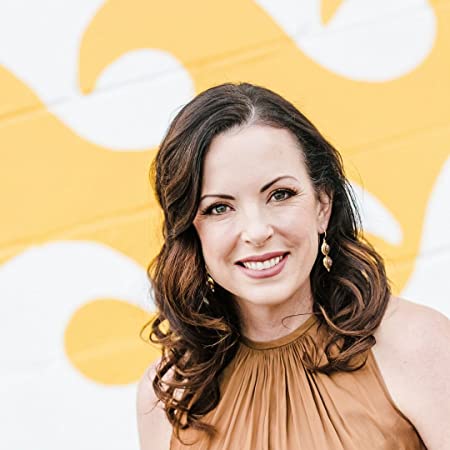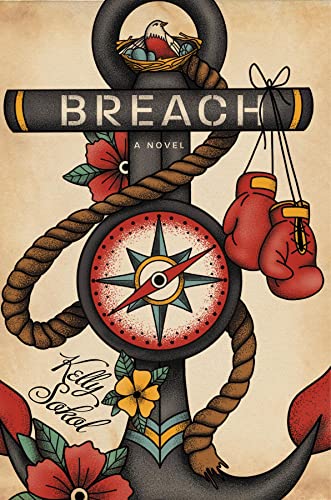
Kelly Sokol’s debut novel, The Unprotected, was named one of Book Riot’s 100 Must-Read Books on Pregnancy, Childbirth, and Mothering. Her work has appeared in publications, including Alpinist, The Manifest-Station, and ConnotationPress, and has been nominated for a Pushcart Prize. Kelly was awarded a National Parks Artist’s residency in 2018. She serves on the board of directors for the Muse Writers Center in Norfolk, Virginia, where she also teaches fiction writing. She received her MFA from Goddard College.

The boundary between battlefield and home front blurs. Are there wounds love can heal?
Marleigh Mulcahy grew up in a boxing gym, the daughter of hard-drinking parents who didn’t keep a stable roof overhead. In the cinder-block Box-n-Go, amidst the sweat and funk, she meets EOD specialist Jace Holt, a highly and expensively trained bomb diffuser with three successful deployments behind him. With a heady mix of hope, carelessness, and a ridiculous amount of courage, they begin a family. When Jace returns to active duty, a roadside bomb resurrects ghosts from the couple’s past and threatens the life they’ve built. An unflinching and timely gaze into the marriage of an enlisted special operator and his wife, Breach is a story of betting it all on love, a couple’s determination to change the trajectory of their lives, and one woman’s promises to the man she loves and the boys they’re raising.
What choices will a desperate mother make to keep her family whole?
- Your new book, Breach, came out in May. What inspired you to write it?
For me, every novel begins with a character. Breach came to me as Marleigh, the protagonist. If I don’t feel invested in the character, I won’t care what she does or what happens to her. I discovered Marleigh Mulcahy, and this whole novel sprung from a writing prompt given to a group of writers one hot summer night in July 2017 at The Muse Writers Center in Norfolk, VA. My friend and mentor Janine Latus led a class called Write Now. My first novel THE UNPROTECTED had debuted that spring and I was working back into the creative process again.
Janine gave us a verbal cue: home. For fifteen minutes, we silently scribbled. One of the writers had a plastic water bottle that expanded in the heat enough to crackle. I began writing a prose list that sprung from that sound. A young woman swirling the last sips of warm water to spit toothpaste out on the ground. One hand held the water bottle; the other braced the young woman against the trunk of a car. The car had an “I heart my sailor” sticker stuck to the rear windshield. Small boys slept inside the car. And on it went. I had to figure out who this woman was, how she’d arrived at this desperate moment, and what she was going to do next. It wasn’t long before I could hear Marleigh and see her, and I knew I was onto something the moment she made a decision that I didn’t expect. She took control of the plot. Breach was always Marleigh’s story.
- All writers approach their stories differently. What’s your process?
I think talking about process is important, because every writer has to find the process that works for them and also realize that their process may need adaptation as their life outside of writing changes. Currently, I write four days a week, maybe five if I’m under a deadline or feeling particularly writing obsessed. I write weekday mornings. The first hour of the day, I spend time on whatever new creative work I have going. My house is quiet then—even the dog is still snoring. After the morning pre-school bus madness, I dig into revisions on a manuscript that’s made it past the first draft stage. Write one, revise one, research one is my favorite way to work. Once I’ve completed the day’s rewriting, I read and research the newest project. Brand new creative work is handwritten into marble composition notebooks, but I can generally revise on my computer.
- Where do you feel most inspired?
For the first time in my writing life, I have my own office and a dedicated space for my work. It’s a cluttered sanctuary, and I adore it. But I don’t need an office to write. If I waited for the perfect time, place, and inspiration for my writing, I’d never get anything done.
When my daughters were babies, I wrote during their nap times out on a screened-in porch. Much of the critical and creative work required for my MFA was written on soccer sidelines. I completed the first draft of my debut novel THE UNPROTECTED at a bustling coffee shop—pro tip, coffee shop owners will share their space and bandwidth generously, but you really do have to order tea, a plain coffee, anything, to justify a stay longer than an hour. And be open to sharing your table with other creatives. You’re going to sit there ignoring each other anyway. I completed the first draft of Breach at my old kitchen table and spent the long rewriting process in my lovely office.
Inspiration respects showing up regularly, eagerly, and with an open heart. Inspiration will find you anywhere; you just can’t be too fussy about what pen and which notebook you have with you. If I’m doing it right and am really in the work, my characters and story follow me everywhere: out for a long run, while I’m running errands, driving carpool. I don’t wait for inspiration; I go find it.
- How did you come up with the title of your book?
I’m terrible with titles. Selecting a title is harder than drafting a novel! For the longest time, I referred to the story as Marleigh—I tend to do that with manuscripts, name them initially after the protagonist.
Breach came about after a long conversation with my husband. He’s a lawyer and loves teasing apart the shades of a word’s meaning. The world “breach” is freighted with meaning. In the Navy special forces community, there are specialists called Breachers. So that resonates. One can breach an agreement or a promise. A perimeter can be breached. And, of course, the words breach and breech are homophones. A breech birth is dangerous, unexpected. In each case, the stakes are high, and potential for tension and conflict is limitless. Breach simply resonated.
- Who are some of your favorite writers or creators?
The list is long, and their work fills my creative soul with joy.
There are so many writers in the Southeastern Virginia area, where I currently call home, whose work I can’t get enough of—Sheri Reynolds and Lydia Netzer and John McManus come immediately to mind. And The Muse Writers Center (www.the-muse.org) has a community of prolific authors. Mike Krentz is churning out page-turning medical thrillers (along with work across multiple genres) and several other Muse writers have novels slated for publication in the coming years.
My two favorite novels of all time are A Pale View of Hills by Kazuo Ishiguru and Jane Eyre by Charlotte Brontë. I can’t count the number of times I’ve read those books. I can always return to them and learn something new.
- How long have you been writing?
I’ve written nearly since the moment I began reading in kindergarten. Writing is how I make sense of the world. I had one of those fuzzy pink diaries with the tiny lock. Creative writing, for so much of my life, was done in secret, in the quiet stolen hours. However, throughout my life, I threw myself in the way of writing and books. In college, I double majored in political science and English, and one of my first jobs out of college was as a press secretary for a US congressman. I didn’t realize it at the time, but that was my first training in fiction writing. I had to learn how to write in a voice that wasn’t my own. But it wasn’t until my early thirties, after becoming a mother, that I decided to make writing a central part of my life. I enrolled in a class at The Muse Writers Center, and I was absolutely, blissfully hooked. I took several more classes and then went on to complete an MFA program and return to the Muse to teach. My debut novel THE UNPROTECTED was published by Skyhorse in 2017. My second novel Breach was published in May. Technically, it’s taken twelve years to write three novels and publish two, but really, it’s taken my entire life.
- What advice would you give to a writer working on their first book?
Your first book isn’t your only book, and your first book may or may not be the book that connects you with readers. The first novel I wrote has now moved with me three times. It lives in printed form in a cardboard box, and that is where it’ll stay. The purposes of that book were to first, find the discipline to write an entire novel replete with a beginning, middle, and an end; second, to learn the difference between episodic scenes and the scenes that drive the story forward; and third, to get just a glimpse of the magic of creating fictional characters who illuminate real-life situations. I love that book, and I refer back to it whenever I need a reminder to keep going, because the more I write and the more I read, the better writer I become. My second (THE UNPROTECTED) and third (Breach) novels are the ones I’ve published.
As a teacher, I have seen students get so hung up on this one book, this one project, that they stall out in their writing. A graduate school mentor in the MFA program I attended reminded us that our creativity is like a wellspring. We won’t run out of ideas, but if we’re not careful, we’ll run out of time. You can always begin a new book while revising the first one.
- What, to you, are the most important elements of good writing?
Character, character, and character. I’m kidding, but only a little. Character is the most important element for me as a reader. If I don’t care about the main character, I won’t invest in the story. Fiction was my first lesson in empathy as a child, and the opportunity to vicariously experience a life outside my lived understanding is everything in a novel.
Narrative tension is a close second. I need to know what’s at stake for the characters. What does the main character want more than anything else in the world? What happens if she gets exactly what she wants? What happens if she doesn’t? Occasionally, writing a scene rife with narrative tension makes me physically uncomfortable. I have learned, though, that is what makes readers devour a story.
- How do you develop your plot and characters?
In both Breach and THE UNPROTECTED, I “met” my main characters in moments of crisis. The details provided my first understanding of Marleigh and what a desperate situation she was fighting to escape. We often use the word detail to mean something insignificant or not worthy of note. In fiction, telling detail is so important. Significant details appeal to our five senses, and it’s through our five senses that I can come to understand the perspective or lens of a person fundamentally different than me.
When I begin a novel, I devote a notebook or two to my central characters. I spend time each day away from my keyboard—with a cup of tea or a glass of wine—jotting notes about the characters. What was their favorite school lunch as a kid? What were they most worried that the bullies in high school would learn about them? What did they store in their middle school lockers? What is shoved in the bottom of a car’s glove box? Some of this information will make it into the narrative, but most will not. This time, this practice, creates intimacy between me and my characters. Marleigh is an adult at the beginning of Breach, but our adult selves are formed by our childhood and teenage selves. It’s painfully clear when a writer hasn’t taken the time to really get to know her characters.
I’m a “plantser” writer, a hybrid of a plotter and someone who writes “by the seat of her pants.” Once I have the moment of crisis for my main character, I use that to structure a very loose outline of scenes that will drive toward and through that crisis. By a few drafts in, my main character takes over. Where I have plotted for her to zig, she, instead, zags. At that point, it’s my job to listen to her.
- How do you use social media as an author?
Social media can be intimidating, especially for a writer like me in her mid-forties. I’m always behind the learning curve.
The best advice I have received—and actually practice—is to focus my time on the social media platforms that already feel the most comfortable. Where am I already interacting with communities in ways that feel authentic and organic? With whom am I interacting even when I don’t have a book to sell? I’m a reader, so I’ve been on GoodReads for years. I love hearing about and sharing book recommendations, and tracking the books I read each year helps me remember what I want to revisit. I avidly follow and participate in trail and ultra-running forums on Instagram and Facebook. I’m authentically and automatically myself there, so sharing my writing life just feels like part of a normal conversation.
I love following TikTok creators and people active on Twitter, but I’m certain any attempts to create my own content there would be like a big electronic belly flop.
- What part of the book was the most fun to write?
Writing the boxing scenes inside the gym was the most fun. For a couple of years in my thirties, I trained at a small boxing gym, and I loved reliving those moments—in all of their sweaty, smelly glory.
- Would you and your main character get along?
I have great respect for Marleigh. She has to fight and scrap for necessities that too many people, myself included, take for granted. Despite life giving her a truly unfair deal, her heart remains so open and so full of love for Jace, for their boys. I wonder if I could take the hits Marleigh does and continue to love and hope. I’d like to think I am that strong.
